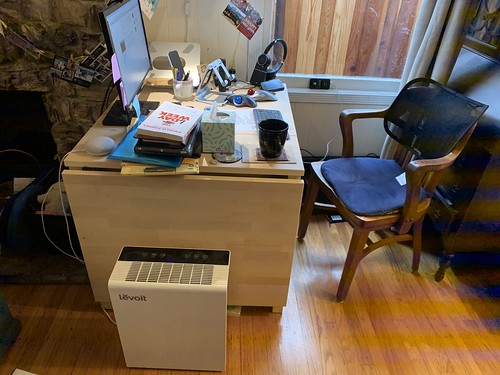I have an air purifier beside my desk. Not by design: they’re just close to each other because both are close to one of the few easily-accessible power outlets in the living room. But according to The Guardian,
In the days after a gas leak was discovered in Aliso Canyon, 30 miles north of Los Angeles, thousands of residents were evacuated from the area, many of whom reported headaches, nausea, stomach aches, dizziness or breathing problems. Students from two nearby schools were relocated and 18 other schools were impacted.
The gas field owner, Southern California Gas Company, responded to the backlash and installed air purifiers in every classroom and office within a five-mile radius of the leak….
[T]he circumstances created an unlikely laboratory to study air quality and its impact on learning. A working paper from the New York University researcher Michael Gilraine found that students who breathed purified air saw gains on math and English tests greater than those who attended schools outside of the boundary.
As Gilraine explains in the abstract of the study, this program essentially created a natural experiment:
I leverage a unique setting arising from the largest gas leak in United States history, whereby the offending gas company installed air filters in every classroom, office and common area for all schools within five miles of the leak (but not beyond). This variation allows me to compare student achievement in schools receiving air filters relative to those that did not using a spatial regression discontinuity design.
So what were the results?
I find substantial improvements in student achievement: air filter exposure led to a 0.20 standard deviation increase in mathematics and English scores, with test score improvements persisting into the following year. Air testing conducted inside schools during the leak (but before air filters were installed) showed no presence of natural gas pollutants, implying that the effectiveness of air filters came from removing common air pollutants and so these results should extend to other settings. The results indicate that air filter installation is a highly cost-effective policy to raise student achievement and, given that underprivileged students attend schools in highly polluted areas, one that can reduce the pervasive test score gaps that plague public education.
The effect is statistically significant but not very large, but, the Guardian notes, “the study adds to the mounting body of research to what we intuitively know is true: polluted air is bad for brains and bodies.” And recently there was s study showing that air pollution has an effect on the performance of elite chess players (not much of a surprise, given how physically and mentally demanding chess is), so perhaps air purifiers and plants should be standard in offices and schools.
